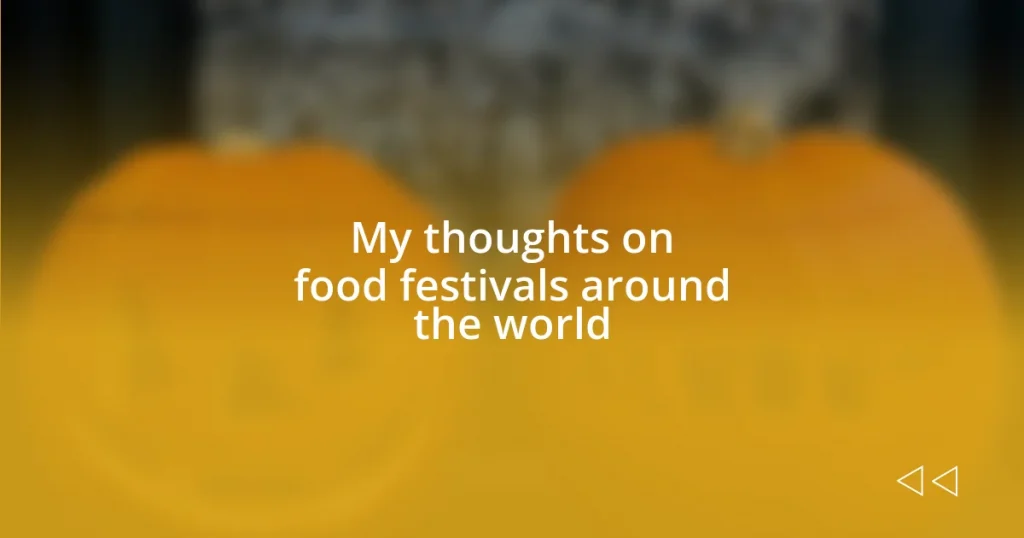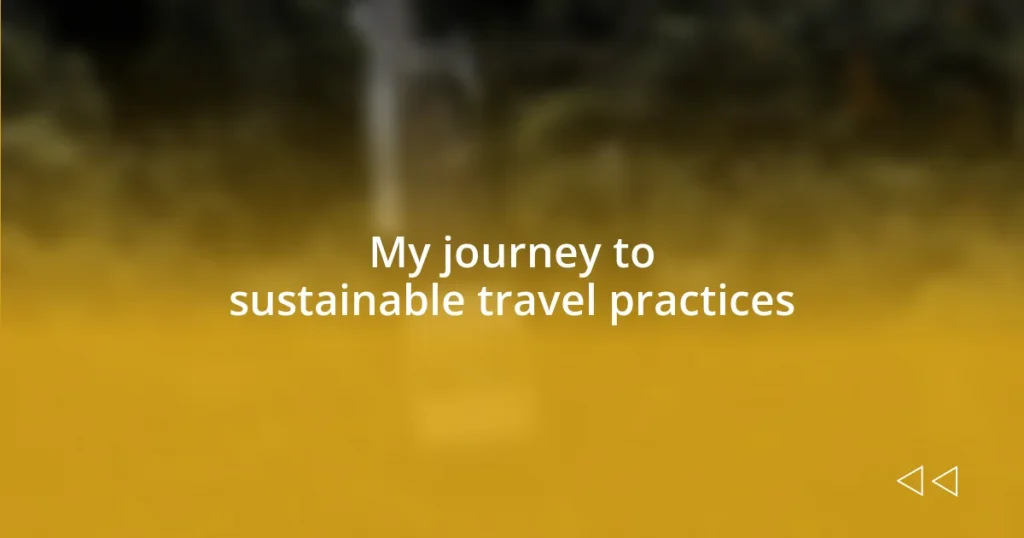Key takeaways:
- Food festivals celebrate local culture, traditions, and culinary heritage, fostering a sense of community and emotional connections through shared experiences.
- They offer a platform for cultural exchange and innovation, allowing chefs to experiment with traditional recipes and introduce unique dishes.
- To fully enjoy food festivals, participants should be open-minded, pace themselves, engage with vendors, and practice good etiquette by being mindful of sampling and respecting shared spaces.

Understanding Food Festivals
Food festivals are more than just gatherings; they embody a community’s spirit and culture. I remember attending my first international food festival, where the air was filled with the aromatic spices of different cuisines. It struck me how food could weave together stories and traditions, creating a tapestry of flavors that connected people from all walks of life.
These festivals often celebrate local ingredients and traditional recipes, showcasing the uniqueness of a region’s culinary heritage. Have you ever tasted a dish that transported you back to a specific moment in time? I certainly have. I recall sampling a handmade pasta that reminded me of my grandmother’s kitchen—warm and inviting. It’s moments like these that make food festivals a transformative experience, stirring nostalgia while introducing new flavors.
Additionally, food festivals serve as a platform for innovation, where chefs experiment and introduce contemporary twists on classic dishes. Sometimes, I wonder how many of these culinary creations are inspired by the festival’s atmosphere and the diverse crowd. I once watched a chef craft a fusion dish that combined elements of traditional sushi with local seafood, and it was a delightful reminder of how food can evolve while respecting its roots.

Cultural Significance of Food Festivals
Experiencing food festivals is like stepping into the heart of a culture. I remember vividly the vibrant energy at a street food festival in Bangkok. The bustling atmosphere, combined with the scent of Thai basil and chili, created a sense of belonging among everyone present. It highlighted how food unites people, transcending language and background, and fostering connections that might not happen otherwise.
Local celebrations often emphasize cherished traditions and rituals. At a small village festival in Italy, I witnessed families coming together to prepare traditional dishes passed down through generations. Sharing these recipes becomes a testament to their history and identity. Each bite carries a story, and it’s fascinating how these culinary moments can evoke such powerful emotions and memories.
Food festivals also provide a stage for cultural exchange and appreciation. I once attended a multicultural food fest where I tasted Ethiopian injera and savor-e tasted Moroccan tagine, conversations flowed freely as we shared our experiences. It reinforced my belief that food is not just about nourishment; it’s a bridge to understanding and respecting different cultures.
| Food Festival | Cultural Significance |
|---|---|
| Hanami (Japan) | Celebration of cherry blossoms, showcasing seasonal food and communal harmony. |
| Oktoberfest (Germany) | Historic beer festival that emphasizes local brews, traditions, and community bonding. |
| Gion Matsuri (Japan) | A summer festival featuring traditional foods and rituals, enriching local identity. |
| La Tomatina (Spain) | A fun festival illustrating community spirit, with food playing a central role in celebration. |

Top Food Festivals to Visit
I’ve always had a soft spot for food festivals that capture the essence of local culture. One of my absolute favorites is the world-renowned Taste of Chicago. Each summer, the city transforms into a culinary wonderland, showcasing everything from deep-dish pizza to gourmet desserts. The vibe is infectious as people savor iconic dishes while mingling with local chefs and food enthusiasts. I fondly remember my first time there when I stood in line for the famous Italian beef sandwich; the anticipation alone made it taste even better.
Here are some other must-visit food festivals that honor culinary traditions and bring people together:
- Gastronomica (Italy): This festival highlights regional Italian cuisines, allowing visitors to participate in cooking classes and tastings.
- San Sebastián Gastronomika (Spain): A celebration of Basque cuisine, this festival attracts chefs and food lovers alike to explore innovative culinary techniques.
- Food and Wine Classic (USA): Held in Aspen, this event showcases exquisite fine dining and offers wine-tasting sessions with top sommeliers.
- Hokkaido Food Festival (Japan): This festival features fresh seafood and Sapporo’s famous ramen, making it a paradise for food lovers.
- Melbourne Food and Wine Festival (Australia): With its blend of local produce and multicultural cuisine, it’s a vibrant celebration of the city’s diverse food scene.
Every food festival I attend deepens my appreciation for the art of cooking and the stories behind each dish. There’s a sense of warmth and unity that transforms simple food tasting into a delightful journey through history and culture.

Unique Dishes at Food Festivals
Exploring unique dishes at food festivals is always an adventure. At the Pancake Day Race in Olney, England, I was mesmerized by the sight of local women tossing pancakes high in the air while racing down the street. The pancakes, filled with everything from classic lemon and sugar to savory mushroom and cheese, became a canvas for creativity. How can something so simple evoke such joy and tradition?
Then there’s the Harbin Ice Lantern Festival in China, where food takes on a whimsical twist. I watched as artisans sculpted intricate ice sculptures, but what caught my attention was the local delicacy known as “jiaozi” or dumplings. Eating them amidst glistening ice and snow added a unique, memorable touch to the experience. Each bite, steamy and savory, was almost like a warm hug against the cold.
Lastly, attending the La Tomatina festival in Spain was a hilarious culinary spectacle. Beyond the chaotic tomato throwing, I was surprised to discover a dish called pisto, a delicious ratatouille-like mixture that locals served up afterward. The blend of flavors was astonishing, and it made me think—how often do we get to experience the juxtaposition of chaos and culinary delight in one day? Such contrasts make food festivals truly special.

Planning Your Food Festival Trip
When planning your food festival trip, the first step is to research the festivals that catch your interest. Think about what types of food excite you. I remember my excitement when I stumbled upon a lesser-known festival focused entirely on street food. The idea of exploring different vendors in one place, each offering unique flavors and stories, was enough to make me book my tickets immediately.
It’s also important to consider your timing. Festival dates can vary from year to year, and some might coincide with peak tourist seasons. For instance, attending the Gastronomica in Italy can lead to delightful culinary experiences, but I found that booking my accommodations well in advance was crucial to securing great spots at reasonable prices. Have you ever tried to find a hotel during peak travel times? It can feel like a mad scramble!
Lastly, don’t forget to check the festival’s schedule and plan accordingly. I’ve made the mistake of arriving too late to catch demonstrations that are often my favorite part of any festival. One year at the Melbourne Food and Wine Festival, I arrived with just enough time to taste a few dishes but missed out on the hands-on cooking sessions I had hoped to attend. So, take my advice: create a list of must-see events and plan your days around them to make the most of your culinary journey. What’s on your festival bucket list?

Tips for Enjoying Food Festivals
One of the best tips I can offer for enjoying food festivals is to go in with an open mind and a willingness to try everything. I remember attending a festival where I initially hesitated to try a dish that combined flavors I never would have paired together. It turned out to be one of the highlight flavors of the event—a fusion of sweet and savory that blew my mind. How often do we limit ourselves by sticking to familiar tastes?
Make sure to pace yourself throughout the event. I once overindulged early on at a festival and ended up missing out on some incredible dishes later in the day. I learned that taking small bites and savoring each dish not only prolongs the experience but also allows for more delightful surprises to come your way. It’s like a treasure hunt for your taste buds—each stall has its own hidden gems waiting to be discovered.
Lastly, don’t underestimate the value of conversation. Engaging with the vendors can enhance your experience significantly. I’ve had some of my most memorable moments by chatting with chefs about their inspirations or the history behind their dishes. Their passion adds a whole new layer to the food and makes the flavors even more resonant. So, have you ever struck up a conversation with a vendor that changed your perception of a dish? I can guarantee it adds a personal touch that is simply unforgettable.

Food Festival Etiquette to Know
Food festival etiquette is essential for ensuring a pleasant experience for yourself and others. First and foremost, be mindful of portion sizes when sampling from various vendors; taking just a small taste can go a long way. I vividly remember a bustling festival where I saw someone pile their plate high, only to abandon half of it later. It’s not only wasteful, but it also limits others from enjoying those flavors. Have you ever felt guilty about leaving food uneaten?
Another important aspect is being patient in line. Festivals can get crowded, and everyone is eager to satisfy their cravings. I recall standing in line at a popular taco stall where the energy was infectious; people chatted and laughed while we waited. It taught me that waiting can be part of the experience. So why not make the most of it?
Lastly, respect the space of others while enjoying the food. I once made the mistake of standing in a crowded area, engrossed in my meal, when I bumped into someone else. It was a reminder that at festivals, we’re all there to share the joy of food. When dining in social settings, being considerate goes a long way. Have you considered how your actions might impact the collective enjoyment of the atmosphere? Keeping this in mind can lead to a more harmonious festival experience for everyone involved.















